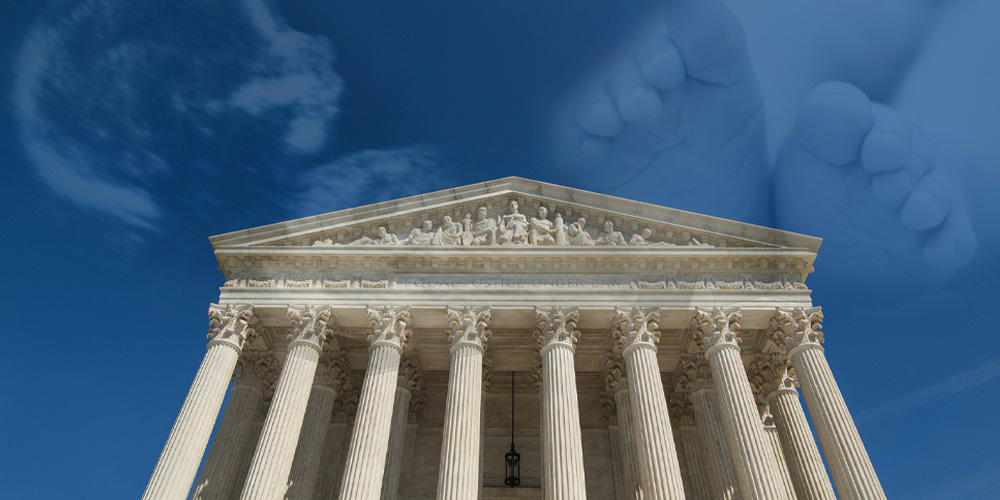 |
Whether Roe v. Wade stays or goes, the lives of unborn babies will continue to matter to all the members of Christ’s church.
Some were probably surprised that she was so strongly pro-life. It was the late 1980s and highly intelligent college students like her were expected to oppose anything that seemed to limit women’s rights. She’d grown up going to church, but not the particularly conservative kind.
But my friend had a simple explanation for her opposition to abortion. She was born in the 1960s, like me, which was before the Supreme Court’s 1973 Roe v. Wade decision which legalized abortion in the United States. One day she was talking with her mother about how things had changed since that decision, and she was shocked when her mom said something like, “I wish I’d had abortion as an option.” My friend knew already that she was what is sometimes called an “oops baby,” which led to her parents getting married. That marriage ended in a difficult divorce. So what she understood her mother saying was that if abortion had been a legal option when she was conceived, she wouldn’t exist.
And I can tell you that the world would be a poorer place if she had never been born. As a friend, as a teacher, as a musician, and just as a wonderful person, she has made a difference in many people’s lives.
That “option” Roe v. Wade gave to mothers in America is very much in the news again—and not just because this month marks its 49th anniversary. Pro-lifers hope that a new case before a more conservative Supreme Court will result in Roe being overturned; abortion advocates fear the same thing. The entire political landscape of the United States could be altered by the court’s decision, and not knowing what it might be has created tension and uncertainty.
We can’t know all that the future holds, but what can pro-life Christians be sure of?
If Roe goes . . .
If Roe v. Wade is overturned (or even significantly limited), the fight over abortion is not over. In fact, the fighting will likely get even worse, as abortion advocates aggressively seek to regain abortion rights. We will rejoice—greatly!—that fewer babies are being killed in their mothers’ wombs, but abortion will not stop everywhere. The end of Roe would simply mean that there is no longer a federal law controlling abortion policies throughout the nation. States that have laws banning abortion will see those clinics shuttered almost overnight, and states that have abortion-friendly laws will continue allowing it as before.
We call it a win not only when we see a newborn resting peacefully in her mother’s arms but also when we see her in church as a child or teen.
Some states, like Vermont and New York, have passed some extremely pro-abortion laws to make sure that a woman’s right to choose is not in any way restricted. It would not be surprising if other states joined them if Roe were to be overturned. Similarly, we would expect to see efforts to have Congress put legal abortion into federal law.
In the same way, the political side of the pro-life movement would still have much work to do. Pro-life gains on the state level would have to be protected and solidified, and the fight to ban abortion would continue in the states that still permit it. And, of course, there are battles to be fought on issues like euthanasia and assisted suicide.
If Roe stays . . .
On the other hand, if pro-lifers’ hopes are dashed and the Supreme Court lets Roe v. Wade stand, the changes we see might be much more subtle. Christian citizens will not simply give up trying to protect the unborn; pro-life efforts will continue. But chances are that they will rely less on politics and legal efforts, since those would be seen as failures over the long term. A pro-life vote for certain candidates and parties would no longer be such a sure thing, political alignments could change radically, and the movement itself might splinter.
Abortion advocates would not likely be content to simply enjoy such a “victory.” Having won at the Supreme Court, they might very well seek to strengthen their position even more, in an attempt to permanently silence those who fight for the unborn. We would expect more legislation at both the state and federal levels to guarantee access to abortion for anyone who might want it whenever she might want it—and worse things beyond that.
This is certain
But among the worst things that could happen would be that pro-life Christians in the United States get so caught up in what they are or were against that they forget what it is they are for. Every human life, whether in the womb, the nursery, the school, the factory, the office, or the hospital room, is a precious and wonderful gift of God, and every human soul is one that Jesus Christ suffered and died to save. We are pro-life because in every way our Lord is pro-people.
So whether Roe stays or goes, the lives of unborn babies will continue to matter to all the members of Christ’s church. We want them not only to be born and experience life as everyone else does but also to be born again through the gospel and experience eternal life. That means that we will remain opposed to abortion but will also take seriously Christ’s commands to love our neighbors and especially to take care of needy mothers and vulnerable children, who are precious in his sight.
Our goal, of course, is to have abortion stopped entirely and permanently, but that will be reached not when some political or legal battle has been won but only when desperate mothers no longer think that killing their babies is an option they would ever want. The Supreme Court won’t get us there. For that kind of victory, hearts must be changed throughout our society. The only tool to accomplish that is the gospel of Jesus Christ.
So we Christians work to bring mothers and their babies to the baptismal font just as we work to make sure every “oops baby” is born. We call it a win not only when we see a newborn resting peacefully in her mother’s arms but also when we see her in church as a child or teen, taking her place in the family of God. We pray and strive not only for the end of the corrupting evil of abortion but also for the birth of faith in lost sinners at every stage of life. And yes, we offer God’s forgiveness, won by Jesus on the cross, to those who have sought, supported, or even performed abortions, because he loved and died for them just as he loved and died for us.
No matter what the future brings our nation, this truth remains: Every life matters to God and therefore matters to us too. So whatever happens we will rely on him—not politics, judges, or movements—to guide our lives and actions and do in our society what he knows to be best. The best option always is trusting the Lord.
Author: Jeffrey L. Samelson
Volume 109, Number 01
Issue: January 2022






